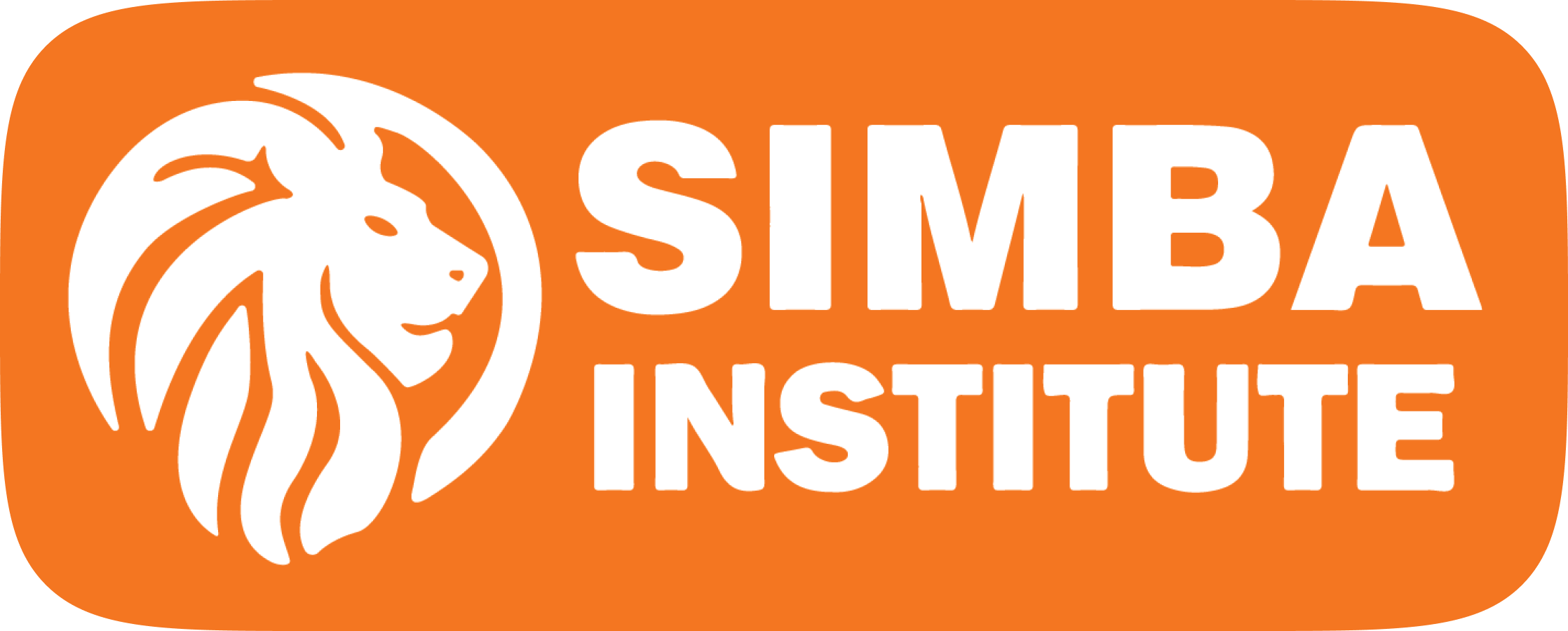ADVANCED DIGITAL MARKETING AND AI COURSE IN SURAT
Our 6 Months Advance Digital Marketing in one of the most demanded course in india where students travelled from across the world to join this advanced course
#Simba Institute Real Results
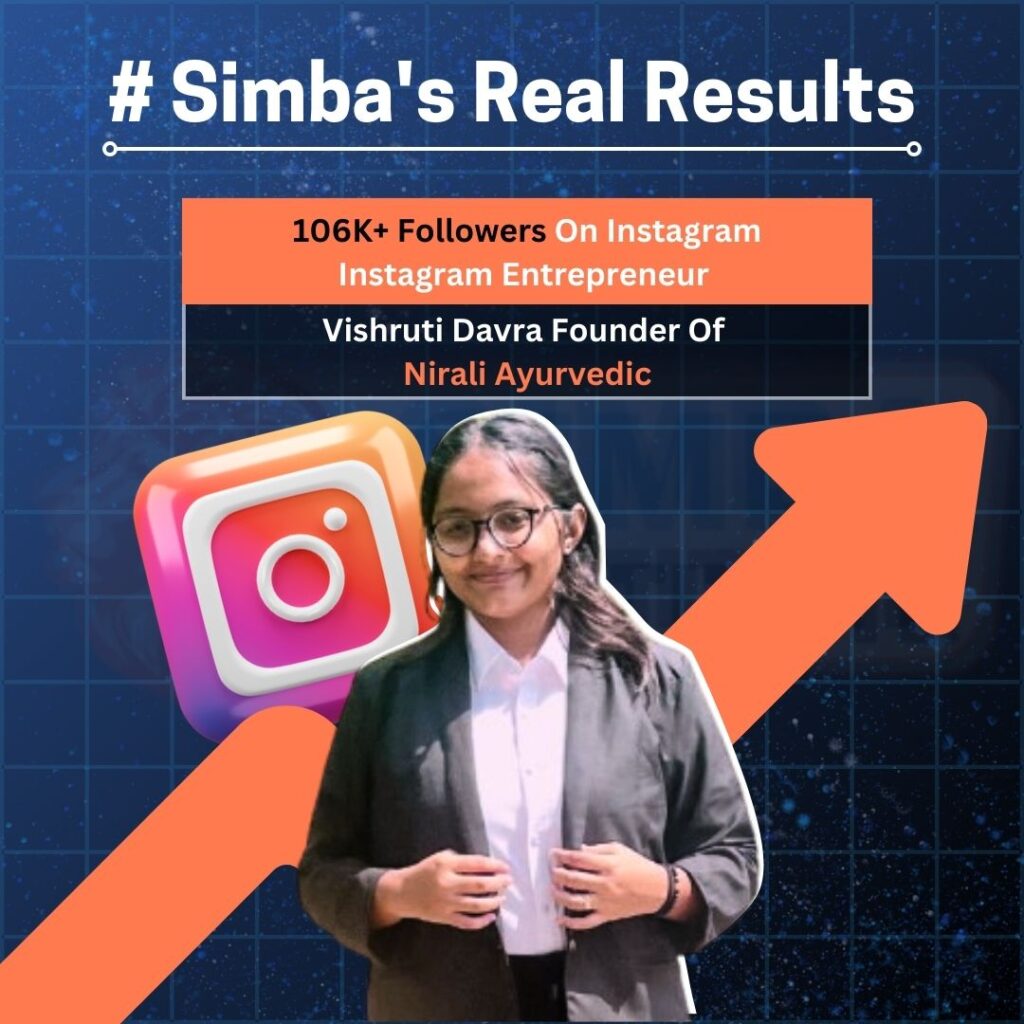
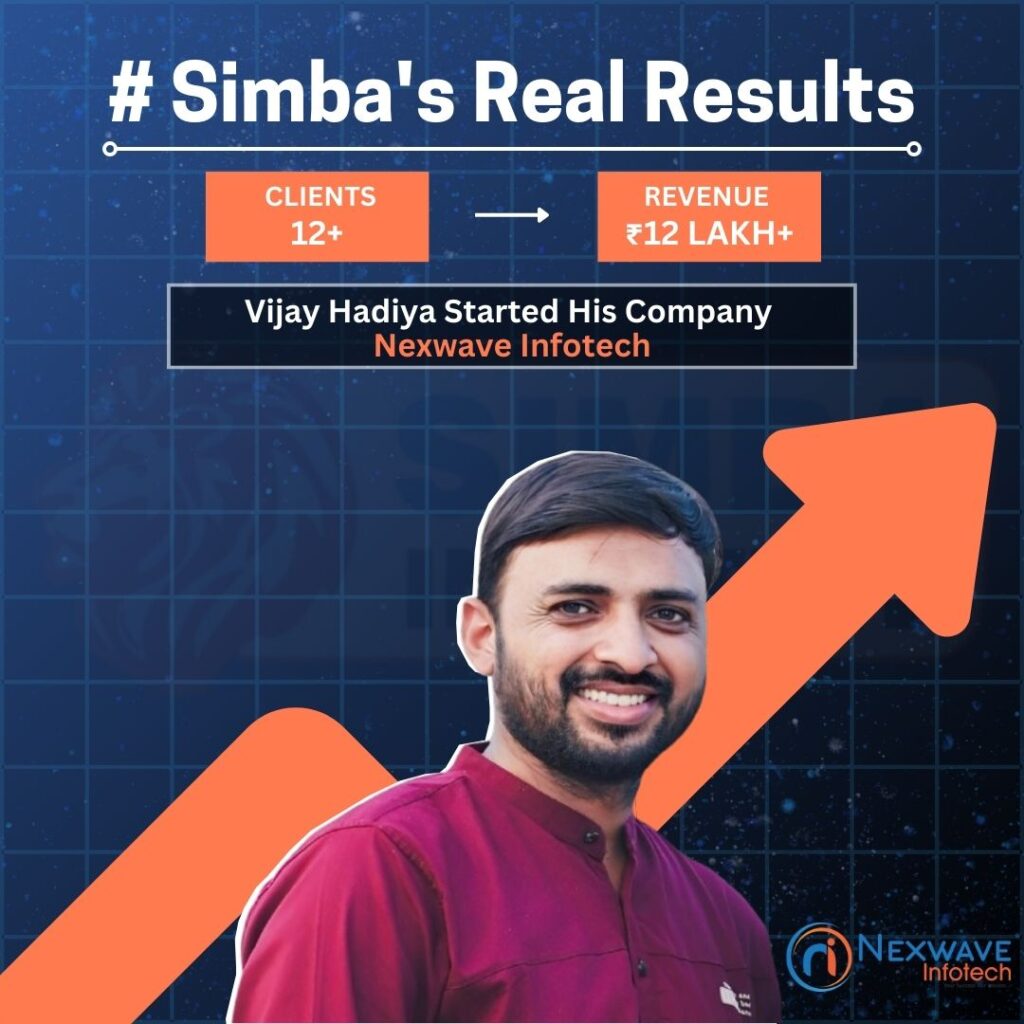
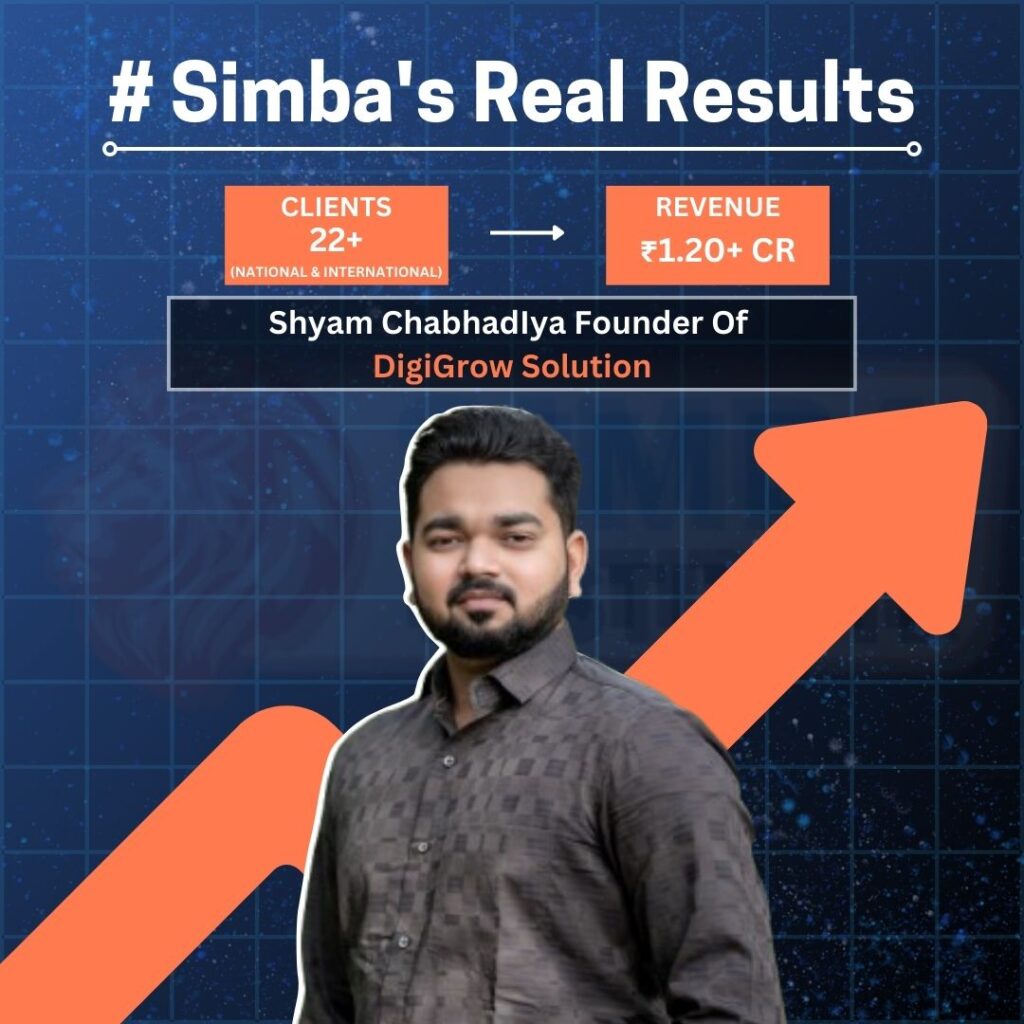



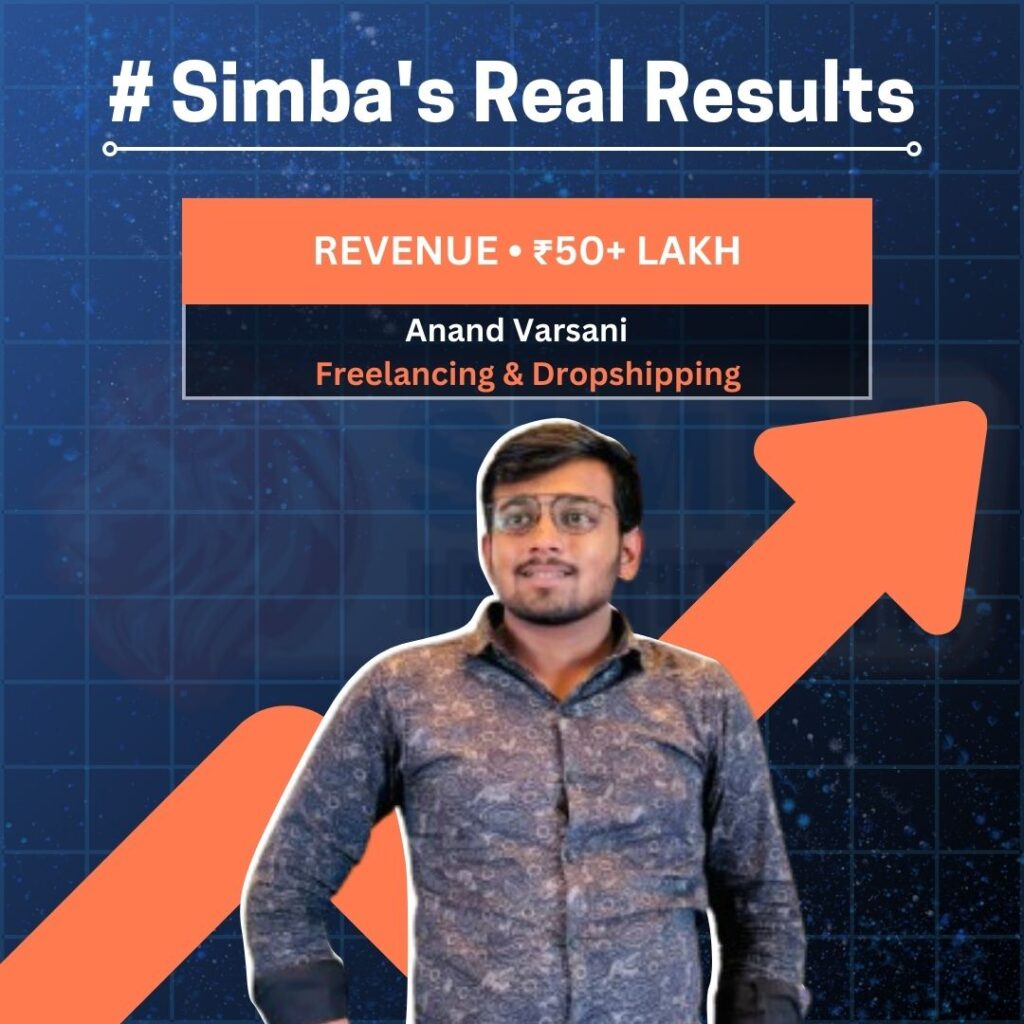

Best Digital Marketing Course In Surat
Start learning Digital Marketing Course in Surat with Simba Institute. Simba Institute provides the Best Digital Marketing Course in Surat. As a digital marketer build your career with Simba Institute with the best learning platform and placement.
The ability to reach a global audience, target particular demographics, track performance, and adjust to shifting consumer behavior while remaining cost-effective and giving businesses a competitive advantage in the digital age means that Digital Marketing Training will still be crucial now.


Pick The Right Course To Build Your Career
Our Advanced Digital Marketing course suitable for
Students and freshers
Professional
Agency Owners
College Students
Homepreneur
Freelancer
Curriculum Ai Powered Strategic Digital Marketing Course in Surat

Digital Marketing Introduction

Infrastructure of Digital Marketing

Social Media Optimization

Advanced Canva Designing

Meta Business Suite Setup

Advanced Facebook Ads

Live Lead generation For Business

Facebook Business Manager

Facebook Pixel Implementation

Advanced Instagram Marketing

Personal Branding Through Linkedin

Advanced Linkedin For business

WordPress Web Development

Advanced Content Marketing

Google Ads (PPC)

Google Keyword Planner

Landing Page Optimization

Google Display Ads

Youtube Video Ads

Google Merchent Center Setup

Search Engine Optimization

Advanced SEO Strategy

Live Link Building Activity

Web Analytics & Reporting

SEO Paid Tools

Email Marketing

Affiliate Marketing

Domastic & International Freelancing

Ecommerce Marketing

Amazon Marketplace Training
Why Simba Institute Of Digital Marketing?

15+ International Certification

25+ Experienced Faculties

100% Practical Training

Works On Live Projects

45+ Digital Marketing Modules

Updated Industry accepted Modules

1-on-1 mentorship

Backup Sessions

1000+ Google Reviews

Guest Faculties

150+ hours live lecture

Marathon Session

Personalized Resume feedback

100+ Placement Partners

Flexible Timings

Focus on Practical Skills

Proven Track Record of Success

Interview Preparation

100% Placements Assitence

Soft-skills enhancement

8+ High Tech Infrastructure

Group Tasks

Recordings of all live sessions

Mock interviews Preparation
How many types of Marketing?
Difference between Traditional and Digital Marketing?
What is Digital Marketing?
Benefits of Digital Marketing
The scope of Digital Marketing
Digital Marketing tools and techniques
case studies of business
Freelancing projects
Key platforms covered include:
Become an expert in Facebook Messenger bots for business through practical case studies and real-world examples.
- Build chatbots to drive lead generation
- Overcome major content challenges
- Connect seamlessly with Facebook business pages
- Design welcome messages and set default responses
- Set up effective conversion navigation
- Streamline multiple chat flows
- Link various blocks to the main navigation
- Craft engaging chatbot dialogues
- Learn how to use elements such as Text Cards, Typing Indicators, Quick Replies, Images, Galleries, Block Navigation, Sequences, and more
- Develop artificial intelligence capabilities
- Launch and manage your chatbot effectively
- Explore other tools for bot development
1.1 Overview of Facebook as a Marketing Platform
1.2 Significance of Facebook Ads for Enterprises
1.3 Aims and Objectives of Facebook Marketing
Module 2: Understanding Facebook Ads Manager
2.1 Exploring the Ads Manager Interface
2.2 Structure of Campaigns, Ad Sets, and Advertisements
2.3 Setting Up Ad Accounts and Managing Permissions
Module 3: Defining Advertising Goals and Audience
3.1 Identifying Advertising Goals (e.g., Awareness, Consideration, Conversion)
3.2 Creating Custom and Lookalike Audiences
3.3 Leveraging Facebook Audience Insights for Market Research
Module 4: Developing Ad Creatives
4.1 Varieties of Facebook Advertisements (e.g., Image, Video, Carousel)
4.2 Creating Engaging Ad Copy and Visuals
4.3 Guidelines for Testing Ad Creatives
Module 5: Ad Targeting Techniques
5.1 Targeting by Demographics (e.g., Age, Gender, Geography)
5.2 Interest-Based and Behavioral Targeting
5.3 Advanced Targeting Methods (e.g., Custom Audiences, Remarketing)
Module 6: Budget and Bid Management
6.1 Determining Ad Budgets and Schedules
6.2 Selecting Suitable Bidding Options (e.g., CPC, CPM, CPA)
6.3 Comprehending Ad Auctions and Delivery Optimization
Module 7: Ad Placements and Formats
7.1 Understanding Various Ad Placements (e.g., News Feed, Sidebar, Instagram)
7.2 Different Ad Formats and Their Requirements (e.g., Single Image, Slideshow, Instant Experience)
7.3 Mobile-Friendly Design and Responsive Ad Formats
Module 8: Monitoring and Analytics
8.1 Implementing Facebook Pixel for Tracking Conversions
8.2 Assessing Ad Performance Metrics (e.g., Reach, Engagement, Conversions)
8.3 Analyzing Facebook Ad Reports and Insights
Module 9: Refinement and Expansion
9.1 Conducting A/B Tests on Ad Creatives, Copy, and Targeting
9.2 Enhancing Ad Campaigns for Improved Results
9.3 Expanding Successful Campaigns and Managing Budgets
Module 10: Advanced Strategies and Techniques
10.1 Utilizing Dynamic Product Ads and Catalog Promotions
10.2 Segmenting Custom Audiences for Personalized Ads
10.3 Advanced Retargeting and Lookalike Audience Techniques
2. Steps to set up Facebook Pixel
3. Track, Optimize, and Expand Your Audience
4. How to evaluate conversions across multiple devices
5. Enhance delivery to the ideal audience
6. Utilize and explore custom audiences based on website activity
7. Study Facebook Pixel events
8. Understanding how Facebook Pixel operates
9. Master conversion optimization strategies
10. Configuring Facebook Pixel
11. How does Facebook Pixel work with WordPress?
12. Achieve your business objectives.
1.1 Overview of Instagram as a Promotional Tool
1.2 Significance of Instagram Marketing for Enterprises
1.3 Aims and Goals of Instagram Promotion
Module 2: Understanding Instagram
2.1 Platform Characteristics, Audience Demographics, and User Patterns
2.2 Distinctions between Personal Profiles, Business Profiles, and Creator Accounts
2.3 Instagram Algorithm and Content Reach
Module 3: Building an Instagram Business Profile
3.1 Establishing and Enhancing an Instagram Business Account
3.2 Crafting a Compelling Bio and Profile Summary
3.3 Leveraging Instagram Insights for Analytics
Module 4: Content Development Strategies
4.1 Varieties of Content (e.g., Photos, Videos, Stories, Reels)
4.2 Formulating a Content Strategy and Publishing Schedule
4.3 Tips for Producing High-Quality and Captivating Content
Module 5: Hashtag Methodology
5.1 Understanding the Role of Hashtags on Instagram
5.2 Identifying and Implementing Relevant Hashtags
5.3 Developing Branded and Campaign-Specific Hashtags
Module 6: Engagement and Community Development
6.1 Techniques for Boosting Interaction (e.g., Likes, Comments, Shares)
6.2 Building and Maintaining an Instagram Community
6.3 Collaborations, Influencer Alliances, and User-Generated Content
Module 7: Instagram Advertising
7.1 Introduction to Instagram Advertisements and Ad Types
7.2 Designing and Managing Instagram Ad Campaigns
7.3 Targeting Strategies, Budget Allocation, and Bidding Tactics
Module 8: Instagram Shopping and Online Sales
8.1 Configuring Instagram Shopping Features (e.g., Product Tags, Shopping Stickers)
8.2 Creating Shoppable Content and Stories
8.3 Maximizing Instagram for Online Sales
Module 9: Instagram Stories and Reels
9.1 Understanding the Value of Stories and Reels
9.2 Creating Engaging Story Content (e.g., Polls, Quizzes, Swipe-Up Links)
9.3 Utilizing Reels for Brand Visibility and Engagement
Module 10: Analytics and Performance Evaluation
10.1 Using Instagram Insights for Performance Review
10.2 Monitoring Key Indicators (e.g., Reach, Impressions, Engagement Rate)
10.3 Analyzing Data and Refining Strategies for Better Results
- Overview of Influencer Marketing
- Basics of Influencer Marketing
- An Introduction to Influencer Promotion
2. Why influencer marketing is needed?
- Why is influencer marketing essential?
- The importance of influencer marketing
- Why do we need influencer marketing?
3. How to find influencers?
- Ways to discover influencers
- Methods to identify influencers
- How to locate influencers?
4. How to choose the right influencer?
- How to select the appropriate influencer?
- Steps to pick the best influencer
- How to find the perfect influencer?
5. Who are Influencers?
- What defines an influencer?
- Who qualifies as an influencer?
- What is an influencer?
- Marketing and insights on LinkedIn
- Leveraging LinkedIn for promotional activities
- Tips to boost your business
- Are LinkedIn Ads effective?
- Crafting a compelling LinkedIn Marketing Plan
- Operating as a LinkedIn Marketing Agency
2. How to manage a domain?
3. Which domain name is most appropriate?
4. What are the platforms to obtain a domain?
5. What does web hosting mean?
6. Why is web hosting necessary?
7. How to set up and use web hosting?
2. Why you don't need to learn to code?
3. What is WordPress?
4. How is WordPress used on a website?
5. What are the benefits of using WordPress?
1.1 Overview of Google Ads and its Advantages
1.2 Understanding How the Google Ads Auction Works
1.3 Setting Up Advertising Goals and Objectives
Module 2: Setting Up Your Account and Navigating the Platform
2.1 Creating a New Google Ads Account
2.2 Exploring the Google Ads Dashboard
2.3 Structuring Your Account: Campaigns, Ad Groups, and Keywords
Module 3: Keyword Research and Selection
3.1 Understanding Different Keyword Match Types (Broad, Phrase, Exact, Negative)
3.2 Conducting Keyword Research with Keyword Planner and Other Tools
3.3 Developing Keyword Lists for Effective Campaigns
Module 4: Writing Ad Copy and Using Ad Extensions
4.1 Crafting Persuasive Ad Copy for Text Ads
4.2 Utilizing Ad Extensions (e.g., Sitelinks, Callouts, Structured Snippets)
4.3 Best Practices for Crafting Impactful Ad Copy
Module 5: Ad Formats and Creative Development
5.1 Exploring Various Ad Formats (Text Ads, Image Ads, Video Ads)
5.2 Designing Creative Assets for Display and YouTube Campaigns
5.3 Testing and Optimizing Ad Creatives
Module 6: Audience Targeting and Segmentation
6.1 Geographic Targeting (Location-Based, Radius-Based)
6.2 Demographic Targeting (Age, Gender, Income)
6.3 Targeting by Interests and Remarketing Lists
Module 7: Bid Strategies and Budget Management
7.1 Understanding Different Bidding Strategies (Manual CPC, Enhanced CPC, CPA)
7.2 Adjusting Bids for Devices, Locations, and Timing
7.3 Managing Budgets and Monitoring Ad Expenditure
Module 8: Conversion Tracking and Performance Analysis
8.1 Setting Up Conversion Tracking with Google Analytics
8.2 Tracking Conversions for Various Campaign Types
8.3 Analyzing Performance Metrics and Key Performance Indicators (KPIs)
Module 9: Display and Video Ads
9.1 Understanding the Google Display Network (GDN) and Available Ad Formats
9.2 Creating Responsive Display Ads and Image Ads
9.3 Video Ads on YouTube: TrueView, Bumper Ads, and Discovery Ads
Module 10: Shopping Campaigns for E-commerce
10.1 Setting Up Google Merchant Center and Product Data Feeds
10.2 Launching Shopping Campaigns in Google Ads
10.3 Optimizing Product Listings and Adjusting Bidding Tactics
Module 11: Campaign Optimization and A/B Testing
11.1 Running A/B Tests for Ad Copy, Landing Pages, and Targeting Options
11.2 Techniques for Optimizing Campaign Performance
11.3 Scaling Successful Campaigns and Finding Growth Opportunities
Module 12: Remarketing and Audience Re-engagement
12.1 Creating Remarketing Lists and Segmenting Audiences
12.2 Setting Up Remarketing Campaigns Across Google's Network
12.3 Advanced Remarketing Strategies for E-commerce and Lead Generation
Module 13: Advanced Strategies and Tactics
13.1 Advanced Audience Targeting (Custom Audiences, Lookalike Audiences)
13.2 Integrating Google Ads Across Channels (Search, Display, YouTube)
13.3 Advanced Optimization Techniques and Automation Tools
1.1 What is SEO and Why it Matters
What is SEO and Its Importance
1.2 What is Search Engines and Algorithms
What Are Search Engines and Algorithms
1.3 Benefits of Organic Search Traffic
Advantages of Organic Search Traffic
Module 2: Understanding Search Engine Basics
2.1 How Search Engines Work
How Search Engines Operate
2.2 Crawling, Indexing, and Ranking
Indexation, Crawling, and Ranking
2.3 Major Search Engines: Google, Bing, Yahoo
Key Search Engines: Google, Bing, Yahoo
Module 3: Keyword Research and Analysis
3.1 Importance of Keywords in SEO
Significance of Keywords in SEO
3.2 Tools for Keyword Research (e.g., Google Keyword Planner, SEMrush)
Keyword Research Tools (e.g., Google Keyword Planner, SEMrush)
3.3 Understanding Search Intent and Long-Tail Keywords
Comprehending Search Intent and Long-Tail Keywords
Module 4: On-Page Optimization
4.1 Title Tags, Meta Descriptions, and Headers
Title Tags, Meta Descriptions, and Headings
4.2 URL Structure and Permalink Optimization
URL Format and Permalink Enhancement
4.3 Content Optimization: Keyword Placement, Density, and Relevance
Content Enhancement: Keyword Placement, Density, and Relevance
Module 5: Technical SEO
5.1 Website Architecture and Navigation
Website Structure and Navigation
5.2 XML Sitemaps and Robots.txt
XML Sitemaps and Robots.txt Files
5.3 Page Speed Optimization and Mobile Responsiveness
Page Speed Improvement and Mobile Compatibility
Module 6: Off-Page Optimization
6.1 Link Building Fundamentals
Fundamentals of Link Building
6.2 Earning High-Quality Backlinks
Acquiring High-Quality Backlinks
6.3 Social Signals and Their Impact on SEO
Social Signals and Their Effect on SEO
Module 7: Local SEO
7.1 Importance of Local SEO for Businesses
Significance of Local SEO for Companies
7.2 Optimizing Google My Business Listing
Enhancing Google My Business Profile
7.3 Citations, Reviews, and Local Link Building
Citations, Reviews, and Local Link Acquisition
Module 8: SEO Tools and Analytics
8.1 Google Search Console: Monitoring and Reporting
Google Search Console: Tracking and Reporting
8.2 Google Analytics: Tracking Traffic and Conversions
Google Analytics: Monitoring Traffic and Conversions
8.3 Third-Party SEO Tools (e.g., Moz, Ahrefs, Screaming Frog)
External SEO Tools (e.g., Moz, Ahrefs, Screaming Frog)
Module 9: SEO Content Strategy
9.1 Content Planning and Ideation
Content Strategy and Planning
9.2 Creating SEO-Friendly Content: Blog Posts, Guides, Infographics
Developing SEO-Friendly Content: Blog Posts, Guides, Infographics
9.3 Content Optimization for Search Engines and Users
Content Enhancement for Search Engines and Users
- Broken Link Checker: Dead Link Finder, Link Integrity Checker
- Whois.com: Domain Lookup Service, Whois Lookup
- Website Speed Tool: Site Performance Analyzer, Web Page Speed Test
- Competitor Analysis Tool: Rival Analysis Tool, Competitor Research Tool
- Mobile Responsiveness Checker Tool: Mobile Compatibility Checker, Mobile-Friendly Test
- Google AdWords Keyword Planner: Google Ads Keyword Planner, AdWords Keyword Tool
- Backlink Tool: Link Building Tool, Backlink Analyzer
- Many Other: Various Additional Tools, Numerous Other Tools
- Use Google Analytics in Digital Marketing: Implement Google Analytics in Digital Marketing
- Techniques related to Google: Methods associated with Google
- Create a website: Build a website
- Place it in a higher rank: Rank it higher
- Get more traffic for your website: Increase website traffic
- Analyze the traffic: Examine the traffic
- Google Analytics is a very deep module: Google Analytics is a comprehensive module
- Training elements: Learning components
- What is Google Analytics?: What is Google Analytics all about?
- Importance of Analytics for Business: Significance of Analytics for Business
- Introduction to Google Analytics: Overview of Google Analytics
- Setup Google Analytics Account: Configure a Google Analytics Account
- Understanding the Bounce Rate: Comprehending the Bounce Rate
- What is meant by Real Time in Analytics?: What does Real Time mean in Analytics?
- What is Audience?: What constitutes an Audience?
- How to check the statistics?: How to review the statistics?
- What is Demographics in Google Analytics Account?: What does Demographics refer to in Google Analytics?
- What is Language in Google Analytics Account?: What does Language signify in Google Analytics?
- What is System and Mobile in Google Analytics Account?: What are System and Mobile in Google Analytics?
- How to check user flow in Google Analytics?: How to analyze user flow in Google Analytics?
- What is ACQUISITION in Google Analytics?: What does ACQUISITION mean in Google Analytics?
- How do you measure ACQUISITION?: How is ACQUISITION measured?
- Search Console at a Glance in Analytics tool: Overview of Search Console in the Analytics tool
- Understanding Goals and Conversions: Grasping Goals and Conversions
- How to set up funnels: How to establish funnels
- Importance of funnels: Significance of funnels
1.1 Overview of Google Search Console and Its Objectives
1.2 Key Features and Advantages of Using Google Search Console
1.3 Differentiating Google Analytics from Google Search Console
Module 2: Setting Up Google Search Console
2.1 Creating a Google Search Console Account
2.2 Verifying Website Ownership and Setting Up Properties
2.3 Adding Various Versions of Your Site (e.g., HTTP, HTTPS, www, non-www)
Module 3: Understanding Search Performance Reports
3.1 Analyzing Search Queries and Keywords
3.2 Monitoring Impressions, Clicks, and Click-Through Rate (CTR)
3.3 Identifying Top Performing Pages and Landing Pages in Search Results
Module 4: Monitoring Website Indexing
4.1 Checking Index Coverage Status and Issues
4.2 Submitting Sitemaps for Crawling and Indexation
4.3 Troubleshooting Indexing Issues (e.g., Indexing Errors, URL Removals)
Module 5: Increasing Website Visibility with Rich Results
5.1 Understanding Rich Results and Structured Data
5.2 Using the Rich Results Report to Track Rich Snippets, Knowledge Panels, and Other Enhanced Results
5.3 Implementing Structured Data Markup for Improved Search Outcomes
Module 6: Improving Mobile Usability and Performance
6.1 Evaluating Mobile Usability Problems and Mobile-Friendly Design
6.2 Monitoring Mobile Search Performance Metrics
6.3 Addressing Mobile Usability Issues and Enhancements
Module 7: Optimizing Website Speed and Core Web Vitals
7.1 Understanding Core Web Vitals Metrics (LCP, FID, CLS)
7.2 Analyzing Page Speed Insights and Performance Reports
7.3 Implementing Recommendations to Enhance Website Speed and User Experience
Module 8: Monitoring Website Security and Manual Actions
8.1 Checking Security Concerns (e.g., Malware, Compromised Content)
8.2 Reviewing Manual Actions and Penalties from Google
8.3 Resolving Security Issues and Handling Reconsideration Requests
Module 9: Understanding Links and External References
9.1 Analyzing External Links (Backlinks) to Your Site
9.2 Identifying Major Referring Domains and Anchor Texts
9.3 Disavowing Unwanted or Harmful Backlinks
Module 10: Exploring Additional Features and Tools
10.1 Using the URL Inspection Tool for Individual URL Diagnostics
10.2 Exploring Performance Enhancements with Google Discover
10.3 Accessing and Analyzing Data via the Search Console API
Module 11: Integrating Google Search Console with Other Tools
11.1 Linking Google Analytics with Google Search Console for Enhanced Insights
11.2 Utilizing Third-Party SEO Tools and Plugins in Conjunction with Google Search Console
11.3 Leveraging Data from Google Search Console for SEO Strategy and Decision-Making
2. Introduction to content marketing
3. How to write content?
4. Why content marketing is important?
5. What are the types of content?
6. How to market content?
7. How to create a blog?
8. How to deliver the blog?
9. Role of social media
1.1 Overview of Online Commerce and Its Significance
1.2 Key Distinctions Between Traditional and Online Commerce Marketing
1.3 Comprehending the Online Commerce Marketing Funnel
Module 2: Launching an Online Store
2.1 Selecting the Appropriate Online Commerce Platform (e.g., Shopify, WooCommerce, Magento)
2.2 Designing and Personalizing an Online Storefront
2.3 Enhancing Product Pages for Better Conversions
Module 3: Product Research and Selection
3.1 Discovering Profitable Product Niches and Market Trends
3.2 Performing Market Analysis and Competitor Research
3.3 Picking High-Potential Products for Your Online Store
Module 4: Online Store Branding and Market Positioning
4.1 Crafting a Unique Selling Proposition (USP)
4.2 Developing a Captivating Brand Narrative and Identity
4.3 Establishing Trust and Reliability with Customers
Module 5: Content Marketing for Online Stores
5.1 Crafting High-Quality Product Descriptions and Visuals
5.2 Creating Content Marketing Strategies (e.g., Blogging, Video Content)
5.3 Utilizing User-Generated Content (UGC) and Customer Reviews
Module 6: Search Engine Optimization (SEO) for Online Commerce
6.1 Enhancing Product and Category Pages for Search Engines
6.2 Conducting Keyword Research and On-Site Optimization
6.3 Developing Backlinks and Off-Site SEO Tactics
Module 7: Email Marketing for Online Stores
7.1 Building an Email Subscriber Base and Segmentation Tactics
7.2 Crafting Impactful Email Campaigns (e.g., Welcome Sequences, Abandoned Cart Recovery)
7.3 Using Personalization and Automation in Email Marketing
Module 8: Social Media Marketing for Online Stores
8.1 Utilizing Social Media Channels for Online Commerce Promotion
8.2 Developing Engaging Content and Graphics for Social Media
8.3 Implementing Social Media Advertising (e.g., Facebook Ads, Instagram Promotions)
Module 9: Paid Advertising for Online Commerce
9.1 Exploring Pay-Per-Click (PPC) Advertising Platforms (e.g., Google Ads, Bing Ads)
9.2 Developing and Refining Product Listing Ads (PLAs)
9.3 Applying Retargeting and Remarketing Techniques for Online Stores
Module 10: Enhancing Conversion Rates (CRO)
10.1 Interpreting Website Data and User Interactions
10.2 Conducting A/B Testing for Product Pages, Calls to Action (CTAs), and Checkout Process
10.3 Applying Best Practices in CRO to Boost Conversions
1.1 Overview of Dropshipping Business Model
1.2 Advantages and Challenges of Dropshipping
1.3 Understanding the Role of Dropship Suppliers
Module 2: Niche Selection and Product Research
2.1 Identifying Profitable Niches and Trends
2.2 Conducting Market Research and Competitor Analysis
2.3 Selecting Winning Products for Dropshipping
Module 3: Setting Up an Online Store
3.1 Choosing the Right eCommerce Platform
3.2 Designing and Customizing Your Dropshipping Store
3.3 Optimizing Product Pages for Conversions
Module 4: Finding Reliable Suppliers
4.1 Researching and Vetting Dropship Suppliers
4.2 Negotiating Terms and Pricing with Suppliers
4.3 Building Relationships with Dropship Suppliers
Module 5: Managing Inventory and Orders
5.1 Handling Inventory Management and Stock Levels
5.2 Fulfilling Orders and Managing Shipping
5.3 Dealing with Returns, Refunds, and Customer Inquiries
Module 6: Marketing and Promotion Strategies
6.1 Developing a Marketing Plan for Dropshipping Business
6.2 Leveraging Social Media Marketing for Dropshipping
6.3 Implementing Paid Advertising and Retargeting Tactics
Module 7: Search Engine Optimization (SEO) for Dropshipping
7.1 Optimizing Product Pages and Category Pages for SEO
7.2 Conducting Keyword Research and On-Page Optimization
7.3 Building Backlinks and Off-Page SEO Strategies
Module 8: Email Marketing for Dropshipping
8.1 Building an Email List and Segmentation Strategies
8.2 Creating Effective Email Campaigns
8.3 Personalization and Automation in Email Marketing
Module 9: Dropshipping Tools and Technology
9.1 Exploring Dropshipping Automation Tools and Software
9.2 Utilizing Analytics and Reporting Tools for Insights
9.3 Integrating with Third-Party Apps and Plugins
Module 10: Customer Service and Support
10.1 Providing Excellent Customer Service in Dropshipping
10.2 Handling Customer Inquiries, Returns, and Refunds
10.3 Building Customer Loyalty and Retention Strategies
Module 11: Financial Management and Pricing Strategies
11.1 Setting Pricing Strategies and Profit Margins
11.2 Managing Cash Flow and Budgeting for Dropshipping Business
11.3 Understanding Taxation and Legal Considerations
Module 12: Scaling and Growth Strategies
12.1 Scaling Your Dropshipping Business Successfully
12.2 Exploring Opportunities for Diversification and Expansion
12.3 Implementing Growth Hacking Tactics for Rapid Growth
Module 13: Risk Management and Compliance
13.2 Ensuring Compliance with Regulations and Laws
13.3 Mitigating Risks and Building Resilience in Your Dropshipping Business
Module 14: Case Studies and Practical Applications
14.1 Real-world Examples of Successful Dropshipping Businesses
14.2 Hands-on Exercises and Workshops
14.3 Group Discussions and Q&A Sessions
1.1 Overview of Shopify and its Capabilities
1.2 Understanding the Advantages of Using Shopify for Online Commerce
1.3 Exploring Various Shopify Plans and Pricing Options
Module 2: Setting Up Your Shopify Store
2.1 Registering for a Shopify Account and Selecting a Subscription Plan
2.2 Configuring Your Store Settings and Preferences
2.3 Personalizing Your Store’s Theme and Design
Module 3: Adding Products to Your Shopify Store
3.1 Entering Product Details (Name, Description, Images, Variations)
3.2 Configuring Product Pricing, Inventory, and Shipping Settings
3.3 Categorizing Products into Collections and Groups
Module 4: Managing Orders and Customers
4.1 Handling Orders and Overseeing Order Fulfillment
4.2 Managing Customer Queries and Support Requests
4.3 Utilizing Shopify's Customer Management Features and Tools
Module 5: Shopify Payments and Payment Gateways
5.1 Configuring Shopify Payments for Safe Transactions
5.2 Connecting Third-Party Payment Processors (e.g., PayPal, Stripe)
5.3 Overseeing Payment Handling and Refund Processes
Module 6: Shopify Apps and Extensions
6.1 Browsing the Shopify App Store for Additional Functionalities and Integrations
6.2 Installing and Setting Up Shopify Apps to Improve Your Store
6.3 Assessing App Effectiveness and Managing App Subscriptions
Module 7: Search Engine Optimization (SEO) for Shopify
7.1 Enhancing Product and Collection Pages for SEO
7.2 Adding Meta Tags, Descriptions, and Alternative Text
7.3 Submitting Your Shopify Store to Search Engines and Tracking Performance
Module 8: Marketing and Promotion Strategies
8.1 Developing Marketing Campaigns with Shopify Email Marketing
8.2 Utilizing Shopify’s Discount Codes and Promotional Tools
8.3 Connecting Social Media Marketing and Advertising with Shopify
Module 9: Analytics and Reporting in Shopify
9.1 Monitoring Sales, Traffic, and Customer Activity with Shopify Analytics
9.2 Creating Reports and Insights to Assess Store Performance
9.3 Leveraging Data to Make Strategic Decisions and Improve Your Store
- The science, psychology, and craft behind a sales funnel
- How to engage users at various stages of the buying journey
- How to create a sales funnel
- The goal of a sales funnel
- Learn the Facebook funnel model
- Facebook marketing strategy
- Achieving maximum conversions
- Why is Email Marketing Important?
- Email Marketing Tools
- Objectives of Email Marketing
- Introduction to MailChimp
- MailChimp Pricing Plans
- Email Marketing Tactics
- Building a Mailing List
- Embedding Forms on a Website
- Adding Subscribers to a List
- Different Types of Email Campaigns
- Developing an Email Campaign
- What does freelancing mean? Why is it essential?
- How to secure projects?
- How to promote the business?
- How to engage with clients?
- Advantages of affiliate marketing
- Steps involved in affiliate marketing
- Strategies for branding and promotion
Panda: First introduced in February 2011, Panda targeted subpar content and websites with thin or duplicate material. It focused on enhancing the overall quality of search outcomes by penalizing sites with inadequate content.
Penguin: Launched in April 2012, Penguin aimed to penalize websites involved in manipulative link-building tactics, such as purchasing links or engaging in link schemes. It targeted spammy and irrelevant backlinks to boost the relevance and quality of search results.
Hummingbird: Deployed in September 2013, Hummingbird represented a significant move towards semantic search. It aimed to understand the context and intent behind search queries more effectively, providing more relevant results, even for intricate or conversational inquiries.
Pigeon: Released in July 2014 (primarily for the US), Pigeon focused on enhancing local search results. It aimed to deliver more precise and pertinent local search outcomes, especially for queries with local intent, by merging traditional ranking factors with location data.
Mobilegeddon: Rolled out in April 2015, Mobilegeddon stressed the importance of mobile-friendly websites in search rankings. It prioritized mobile-responsive websites in mobile search outcomes, penalizing those that weren't optimized for mobile devices.
RankBrain: Announced in October 2015, RankBrain is a machine-learning component of Google's core algorithm. It helps Google better interpret the meaning behind search queries, particularly ambiguous or novel ones, by understanding search intent and delivering more pertinent results.
Fred: First observed in March 2017, Fred targeted websites with poor-quality content and aggressive monetization strategies. It aimed to penalize sites primarily created for profit rather than providing value to users.
Medic: Unofficially named in August 2018, the Medic update seemed to concentrate on enhancing the quality and relevance of health-related search results. It particularly affected websites in the health and wellness sector, emphasizing expertise, authority, and trustworthiness (E-A-T).
BERT: Released in October 2019, BERT (Bidirectional Encoder Representations from Transformers) enhanced Google's understanding of natural language processing. It helped Google better understand the context of search queries by considering the full context of words rather than just keywords.
Page Experience Update: Announced in May 2020 and initially rolled out in June 2021, this update focuses on user experience metrics such as Core Web Vitals (loading speed, interactivity, and visual stability), mobile-friendliness, HTTPS usage, and the absence of intrusive interstitials. It aims to prioritize websites that provide a superior overall user experience."
Start learning Digital Marketing Course in Surat with Simba Institute. Simba Institute provides the Best Digital Marketing Course in Surat. As a digital marketer build your career with Simba Institute with the best learning platform and placement.
The ability to reach a global audience, target particular demographics, track performance, and adjust to shifting consumer behavior while remaining cost-effective and giving businesses a competitive advantage in the digital age means that Digital Marketing Training will still be crucial now.
The Importance of Digital Marketing Courses in Surat for IT organizations in today’s tech-driven world cannot be pointed out. The digital environment is still changing. We accept the challenges and provide the best knowledge related to digital marketing that’s why we are the Best Digital Marketing institute in Surat.
Digital marketing Course in Surat is mainly based on Social Media like Facebook, Instagram, and LinkedIn. We provide the best ad knowledge related to these social media platforms.
What is Digital Marketing Course in Surat?
Digital Marketing is also known as online marketing or Internet marketing. Digital Marketing is the process of promoting a brand online. With the aid of a Surat digital marketing course in Surat, you can easily interact with the public and draw in new clients.
Digital Marketing Institute, one of the most successful marketing strategies currently employed by businesses, maintains a brand on the cutting edge.
A digital marketer can use some tactics to advertise a business, including display advertising, search engine marketing, social media marketing, and posting online videos.
You must effectively distribute both text-based and multimedia content as part of the Digital Marketing Course in Surat. A skilled digital marketer knows how to put concepts into reality, and Surat’s Digital Marketing supports the growth of brands.
Because it’s the best method for growing a brand’s online exposure, learning every aspect of Digital Marketing Training is now required. By doing this, a brand can increase its internet reputation for good, which increases overall sales.
Digital Marketing Course in Surat
The Simba Institute is the best Digital Marketing Training Institute in Surat. By studying more about Digital Marketing here, you will get the expertise required to begin working as a Digital Marketer.
We help you grasp a variety of Digital Marketing Course in Surat concepts so you can promote a company to a wider audience. You’ll see how Digital Marketing improves a brand’s online presence and makes it easier to reach the target demographic.
Here, we offer the greatest instruction, and our professionals assist you in comprehending how to apply the ideas to problems that you will face in the real world. We will assist you in learning the details before enrolling in the Digital Marketing Institute to clear up any confusion.
As you look into how Digital Marketing creates practical answers, we are here to help. This gives the audience the best opportunity to understand the company’s products and services.
Consequently, Simba is your best choice if you’re seeking the top Surat’s Digital Marketing Institute. You can enroll in the course right away, and we are always here to help. In this way, you may learn how we help students develop careers in Digital Marketing Course in Surat.
The future of the digital world is surprising given that the government now favors digital India as well. By selecting the best Digital Marketing Course in Surat, which will determine your future in this industry, you can brighten it.
Basic Topic That We Cover in Digital Marketing Course
- Social Media Marketing
- Search Engine Marketing (SEM)
- Search Engine Optimization (SEO)
- Email Marketing
- Automation
- Affiliate Marketing
- Content Marketing
- Sponsored Content Marketing
- LinkedIn Marketing
- Mobile Marketing
- Pay-Per-Click Advertising
Data Analytics and Their Importance in Digital Marketing Course in Surat
Analytics and data are essential to digital marketing course in surat because they let companies monitor and assess the effectiveness of their efforts and make data-driven choices.
Marketers may improve the efficacy of their campaigns and hone their plans by obtaining insights from a variety of metrics and data sources.
Utilizing analytics to track and measure campaign performance involves:
Implementing web analytics tools, such as Google Analytics, to monitor website traffic, user behaviour, and conversion rates. Setting up conversion tracking to measure the success of specific actions, such as form submissions or purchases for Digital Marketing Course in Surat.
Analyzing data from social media platforms to understand engagement levels and audience demographics.
Utilizing A/B testing to compare different variations of landing pages, emails, or ads to determine the most effective approach.
Leveraging data to make data-driven decisions requires:
Collecting and analyzing customer data, such as demographics, behaviour, and preferences, to understand their needs and tailor marketing strategies accordingly.
Utilizing market research data to identify industry trends, customer pain points, and competitors’ strategies. Incorporating customer feedback and reviews to improve products or services and enhance the overall customer experience for the Digital Marketing Course in Surat.
Applying predictive analytics and machine learning algorithms to forecast future trends and optimize marketing strategies in The Digital Marketing Course in Surat.
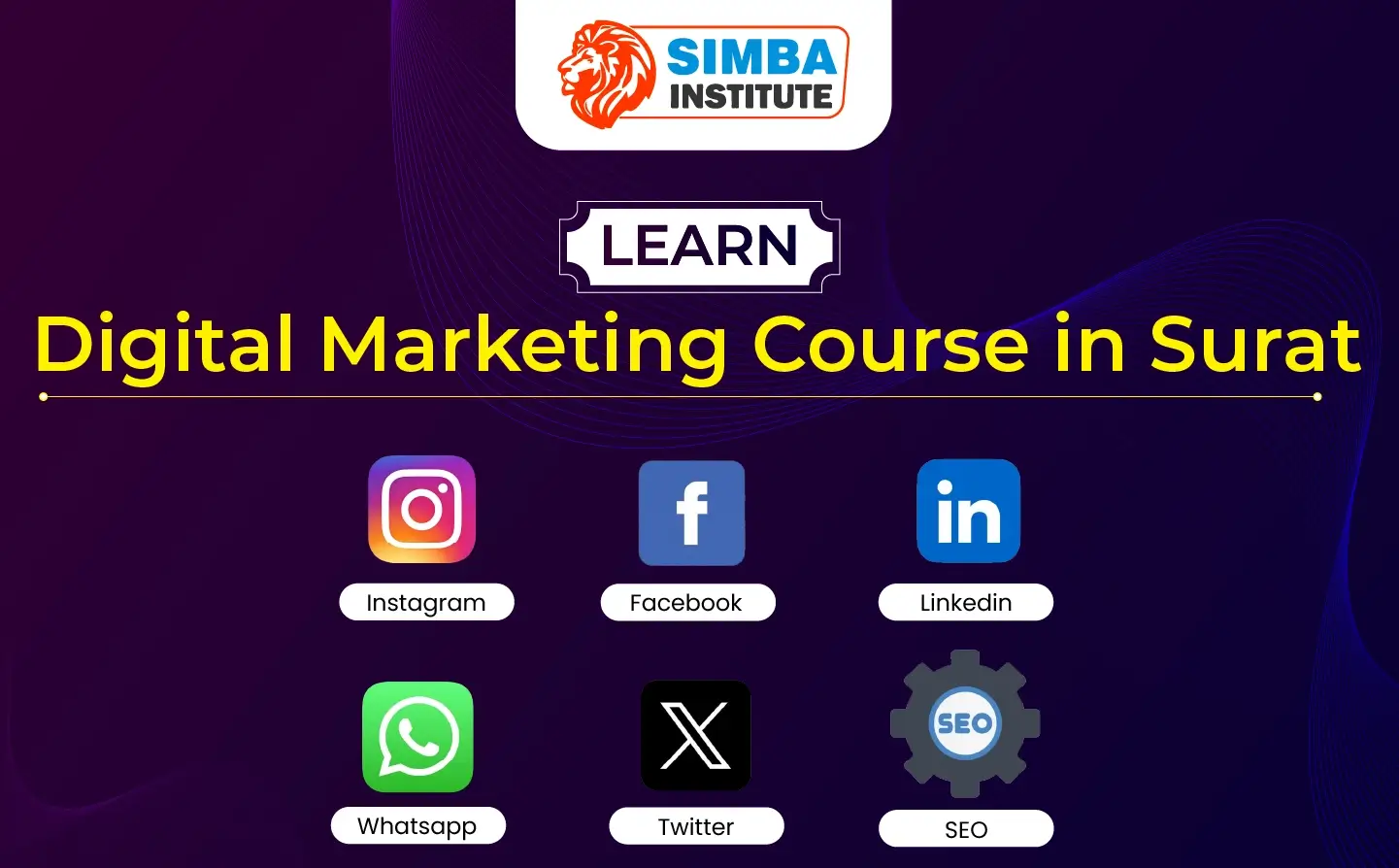
Top Certifications For Getting Placed After Your Digital Marketing Course in Surat
After completing The Digital Marketing Course, certifications can be useful for improving employability and getting a job. Some certificates are extremely valuable in the world of digital marketing because they show a person has knowledge and experience in particular fields.
Let us look at a few of the best certifications that, when completed, can help people get into the job of their dreams on Digital Marketing Course in Surat.
Google Ads Certification On Digital Marketing Course in Surat
A person’s ability to use Google’s advertising platform is proved by their Google Ads Certification on Digital Marketing Course in Surat. It shows the capacity to create and manage successful advertising campaigns for a range of media, including mobile, display, video, sales, and search.
In the field of digital marketing, this certification is highly valued, particularly for jobs in e-commerce, online businesses, and digital advertising agencies. Professionals can show their expertise with creating targeted traffic, optimizing return on investment, and completing business goals through organized advertising campaigns by winning a Google Ads Certification.
- Demonstrates proficiency in Google Ads.
- Validates ability to manage ad campaigns effectively.
- Highly valued by employers in digital marketing agencies and e-commerce companies.
Facebook Blueprint Certification On Digital Marketing Course in Surat
The Facebook Blueprint Certification proves to one’s expertise with Facebook marketing and advertising solutions in the Digital Marketing Course in Surat. Ad development, targeting options, campaign optimization, and performance analysis are just a few of the topics it covers.
Professionals in the field of social media marketing highly value this certification because it shows expertise in using Facebook’s advertising platform to reach and engage Facebook Blueprint Certification is a way to confirm someone is proficiency with Facebook marketing and advertising solutions.
It covers a wide range of subjects, including campaign optimization, targeting options, performance assessment, and ad generation. This certification shows expertise in connecting and engaging with target audiences through Facebook’s advertising platform, which makes it highly valued by people in the social media marketing field. People work in the very competitive industry of Digital Marketing.
- Validates expertise in Facebook advertising and marketing solutions.
- Covers ad creation, targeting options, campaign optimization, and performance measurement.
- Highly sought-after for social media marketing roles.
Hootsuite Social Marketing Certification On Digital Marketing Course in Surat
The Hootsuite Social Marketing Certification aims to provide individuals with the skills and knowledge to achieve success in social media marketing Courses in Surat.
This certification covers a variety of topics related to content generation, scheduling, analytics, and social media strategy using the Hootsuite platform. Aspiring digital marketers, social media strategists, and social media managers that want to grow in the industry and improve their skill sets should definitely check it out.
Professionals may show that they are effective at running social media campaigns, connecting with audiences, and helping organizations achieve measurable results by achieving the Hootsuite Social Marketing Certification in Digital Marketing Course in Surat.
- Demonstrates proficiency in social media marketing using the Hootsuite platform.
- Covers social media strategy, content curation, scheduling, and analytics.
- Ideal for aspiring social media managers and digital marketers.
Google Analytics Individual Qualification (IQ) On Digital Marketing Course in Surat
The Google Analytics Individual Qualification (IQ) is a certification that points to one’s ability to track website traffic, analyze user behavior, and assess the success of marketing campaigns in TheDigital Marketing Course in Surat.
Data collection, reporting, conversion tracking, and attribution modeling is just a few of the areas it covers. For those working in the field of digital analytics, this certification is highly recognized because it shows that one can use data-driven insights to optimize marketing campaigns while helping strategic decision-making.
A person may improve their credibility as an analytics professional by opening up new career prospects in the field of digital advertising by earning the Google Analytics IQ Certification On Digital Marketing Course in Surat.
- Validates proficiency in using Google Analytics for website traffic analysis.
- Covers data collection, reporting, conversion tracking, and attribution modelling.
- Highly valued for roles in digital analytics and web optimization.
Content Marketing Institute (CMI) Certification On Digital Marketing Course in Surat
The Content Marketing Institute (CMI) Certification provides complete training in best practices, methods, and methods for content marketing On Digital Marketing Course in Surat. It discusses many different subjects, like the creation, delivery, advertising, and measurement of content.
Digital Marketing Course in Surat certification is perfect for people who want to grow in their industries as digital content managers, strategists, and authors while also improving their content marketing skills. Professionals can prove their expertise in creating and implementing effective content marketing strategies that increase engagement, send leads, and fulfill business objectives by obtaining the CMI Certification.
- Provides training in content marketing strategies and best practices.
- Covers content creation, distribution, promotion, and measurement.
- Ideal for roles in content marketing and content strategy.
Trends and Innovations in Digital Marketing Course in Surat
Businesses need to keep up with the latest innovations and trends if they hope to stay one step ahead of the fierce competition in the digital space. Artificial intelligence (AI) and voice search optimization (VSO) are two major innovations that will impact the Digital Marketing course in Surat.
By automating processes, expanding personalization, and upgrading customer experiences, artificial intelligence (AI) in the Digital Marketing Institute in Surat Creates New Opportunities.
The way that organizations communicate with their customers and send tailored marketing messages has been revolutionized by AI-powered chatbots, personalized recommendation engines, and predictive analytics.
As voice-activated devices, like smart speakers and virtual assistants, proliferate, voice search optimization is also gaining ground. Businesses that want to take advantage of this expanding trend and make sure they are visible in voice search results must optimize their content and website architecture for voice inquiries in the Digital Marketing Course in Surat.
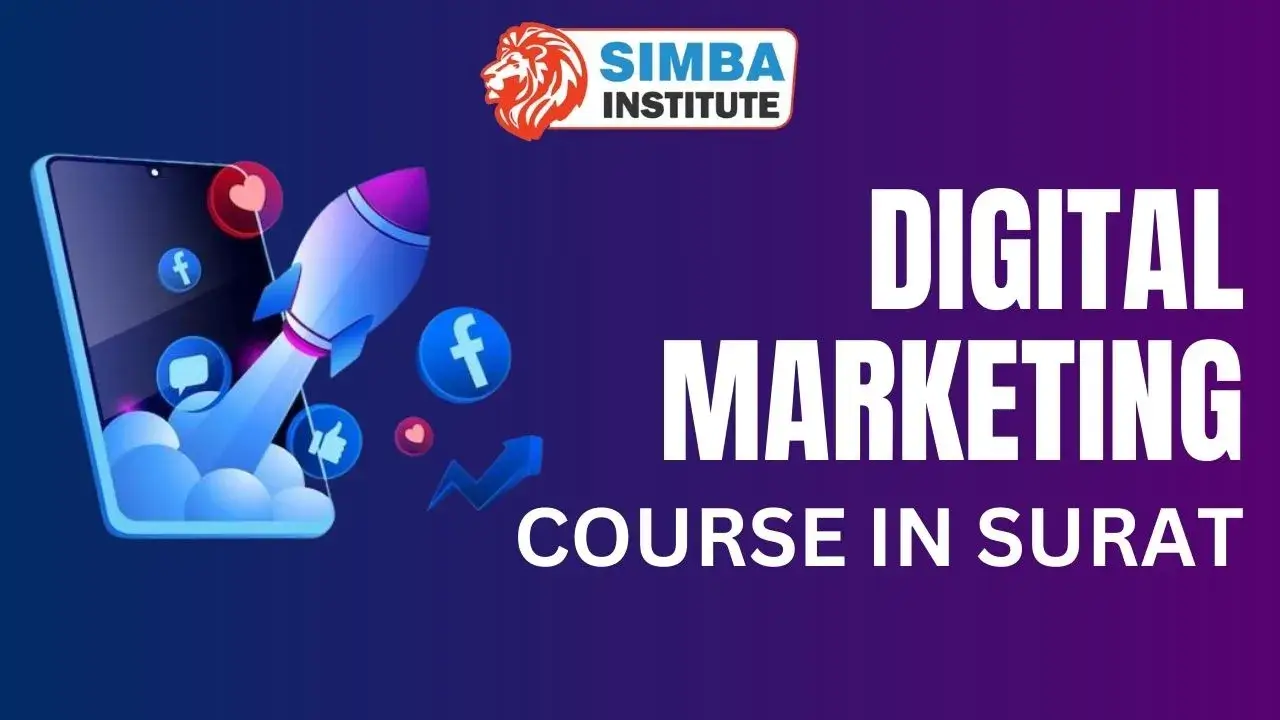
Why is The Digital Marketing Course in Surat So Popular?
Digital marketing is a term that is used in both marketing departments and executive suites in the fast-paced world of modern Business. This comprehensive approach has completely changed the way businesses engage with their customers and is now the center of all marketing campaigns in The Digital Marketing Course in Surat.
But why does digital marketing continue to grow at such a rapid pace and become such a ubiquitous and important tool for companies across the globe?
1. Superior Reach and Accessibility: Digital marketing allows companies to engage with customers worldwide, regardless of location. Brands are no longer limited by the limitations of conventional marketing channels, as a result of the widespread use of social media and internet-enabled devices.
2. Targeted and Personalized Approach: The Digital Marketing Course in Surat makes it possible to create campaigns that are highly targeted and customized, in contrast to traditional marketing strategies that rely on mass messaging and broad demographics. Marketers may ensure that messages are resonant with the appropriate audience segments by customizing content and promotions to target demographics, interests, and behaviors through data analytics and user insights.
3. Measurable outcomes and cost-effectiveness: Businesses of all sizes can compete on an even playing field with digital marketing, which enables startups and SMEs to do so on comparatively small budgets against industry titans. Additionally, by allowing marketers to allocate resources effectively and monitor return on investment (ROI) in real-time, the pay-per-click (PPC) model and other performance-based advertising options guarantee that every dollar spent yields noticeable results.
4. Engagement and Interaction: Digital marketing is characterized by its focus on interaction and engagement. Social media platforms, blogs, forums, and other digital channels allow brands to build deep relationships with customers, asking for feedback, resolving issues, and building brand loyalty along the way.
5. Continuous Innovation and Adjustment: Because of the rapid advancement of technology and the constant shifting preferences of consumers, the digital landscape is constantly changing. This dynamic environment is ideal for digital marketing, which is always changing to incorporate new trends and technologies like voice search, interactive content, augmented reality, and artificial intelligence.
6. Data-Driven Decision Making: Data is the fundamental component of digital marketing since it provides the information needed for well-informed choices and strategic optimization. Marketers can improve their strategies and promote ongoing progress by gaining actionable insights into consumer behavior, campaign performance, and industry trends through the use of powerful analytics tools.
7.Higher ROI: The goal of all marketing endeavors is to increase return on investment (ROI), and digital marketing provides unmatched opportunities to do just that. Businesses can optimize their marketing spend to maximize returns by utilizing real-time analytics, precise audience segmentation, and targeted advertising. Digital marketing is different from traditional methods in that it provides more detailed campaign performance tracking.
This allows marketers to determine what works and what doesn’t, and then modify their strategies accordingly. Using data to inform decisions about resource allocation not only helps businesses become more efficient but also makes sure that every dollar spent on marketing actually produces results and advances the company as a whole.
Why Digital Advertising Is Growing Rapidly in India Including Digital Marketing Course in Surat
Digital Marketing Course in Surat is One of the segments of the Indian advertising market that is growing the fastest. In India, digital advertising is expected to grow by 67% by 2026, to reach INR 208,550 crore. The use of digital platforms like mobile phones, social media, and search engines by Indian consumers is what is responsible for this increase.
Challenges and Transparent Thought in Digital Marketing Course in Surat
Although Digital Marketing Course in Surat have a lot of promise, businesses also need to cope with challenges and moral dilemmas. The two key concerns are safeguarding privacy and data, and stopping clickbait and online ad fraud.
As stories about data breaches and the improper use of personal information gain media attention, privacy concerns and safeguarding user data have grown in significance.
Marketers must adhere to regulations, such as the General Data Protection Regulation (GDPR), and implement robust data security measures to earn and maintain customers’ trust in The Digital Marketing Course in Surat.
Dealing with online ad fraud and clickbait poses a threat to the integrity of Digital Marketing Course in Surat. Click farms, fake impressions, and misleading advertising practices undermine the effectiveness and credibility of digital advertising.
Implementing strict ad verification processes and partnering with reputable ad networks help combat ad fraud and ensure honest targeting and measurement of campaigns.
Strategies for Successful Digital Marketing Course in Surat’s Campaigns
To succeed in Digital Marketing Course in surat, businesses must adopt effective strategies aligning with their goals, target audience, and industry. Creating buyer personas and establishing clear, measurable objectives are two key strategies for effective advertising On Digital Marketing Course in Surat.
Setting Clear and Measurable goals allows businesses to define their desired outcomes and track progress accurately. Goals should be specific, measurable, achievable, relevant, and time-bound (SMART), whether they aim at raising brand awareness, increasing website traffic, or generating leads in The Digital Marketing Course in Surat.
Developing buyer personas is crucial for effective targeting. Businesses can learn more about the needs, drivers, pain areas, and preferred channels of their potential clients by developing extensive profiles of them. This information enables customized and targeted marketing initiatives that connect with the target market and motivate desired behaviour.
In this comprehensive article, We looked at the broad range of Digital Marketing Training, including its history, development, and various outlets. We talked about the significance of analytics and data for campaign measurement and decision-making, as well as popular trends like AI and voice search optimization, obstacles that marketers deal with, and ethical issues.
Additionally, we highlighted methods for effective Digital Marketing efforts, highlighting the need to create buyer personas and define clear goals.
Why Should You Choose Simba Institute for Digital Marketing Course in Surat?
Are you looking for the Best Digital Marketing Course in Surat, to develop winning marketing plans?
You have come to the right place if you want to learn new abilities with our Surat Digital Marketing Course in Surat which will enable you to create engaging marketing strategies that will boost customer sales.
We are the best location to offer a Digital Marketing Course in Surat. It’s simple to apply for Surat’s Digital Marketing Training programs, and doing so can open up more job options for you.
You can learn how to work on a real project by attending classes at our institute that combine theory and practice. Professors take good care of each student, and you are welcome to participate in discussions to provide clarification. You will gain expertise, which will help you to clarify any issue.
Primary Focus What makes us the best option for Digital Marketing Institute in Surat? The following four characteristics set us apart from other companies that provide Digital Marketing Training in Surat.
- 100% practical training
- 100% certified course
- Real-time live project training
- 24×7 supportive faculty
- The latest techniques and tools used
- Group Discussion for Solving Doubt
Which Position Did You Place in the Company After Finishing the Digital Marketing Course in Surat At Simba Institute?
You could be able to apply for highly paid jobs like digital marketer, Digital Marketing expert, SEO expert, SEO specialist, social media manager, google ads specialist, analytics expert, etc. after completing your Digital Marketing Course in Surat.
High-Paying Job Roles After Digital Marketing Course in Surat
As companies shift their customer engagement to online channels, there is an unprecedented need for qualified digital marketers. Together, we will examine the future of digital marketing in India, including lucrative career opportunities, necessary competencies, and the changing landscape of this rapidly developing sector.
Digital Marketing Manager: The Digital Marketing Manager is the leader in India’s digital marketing field, creating campaigns that connect with consumers through a variety of digital media. With responsibilities spanning strategy development, campaign execution, and performance analysis, this role commands a competitive salary commensurate with its strategic significance.
In India, digital marketing managers can anticipate yearly salaries of up to ₹10 lakhs, with significant opportunity for advancement as they develop their leadership abilities and produce tangible business outcomes.
Skills Required:
- Proficiency in data analytics, market research, and consumer behaviour analysis:
- Understanding of various digital channels
- Strong communication, leadership, and project management skills
SEO Professional: In the realm of search engine optimization (SEO), professionals wield the power to elevate brands’ visibility and drive organic traffic to their websites. With Google’s algorithms evolving constantly, the role of an SEO Professional is dynamic and ever-evolving.
Skilled SEO specialists in India can command lucrative salaries, ranging from ₹4 to ₹8 lakhs per annum, as they leverage their expertise to optimise websites, conduct keyword research, and monitor search engine rankings.
Skills Required:
- Proficiency in on-page and off-page SEO techniques, including website optimization, link building, and content strategy, is paramount.
- Deep understanding of search engine algorithms and analytics tools empowers professionals to track performance metrics and refine strategies.
- Ability to drive organic traffic and improve search rankings through strategic optimization efforts.
Social Media Manager: The increasing prevalence of social media in India’s digital landscape has made the role of a Social Media Manager indispensable for brands looking to interact with consumers on well-known platforms such as Facebook, Instagram, Twitter, and LinkedIn.
In India, social media managers can make between ₹3 and ₹6 lakhs annually by using their strategic thinking and creative writing skills to manage online communities, create engaging content, and increase brand awareness and engagement After Learn Digital Marketing Course in Surat.
Skills Required:
- For social media managers, a combination of creativity, analytical skill, and strategic thinking is essential.
- Captivating an audience requires proficiency in copywriting, visual storytelling, and content creation.
- Optimising campaigns requires a deep understanding of advertising platforms and social media analytics.
- able to use social media strategically to target particular audience segments and maximise ROI.
Content Marketing Manager: The digital world is all about content, and content marketing managers are the designers of visually striking brand narratives. To connect with their target audiences, these experts create interesting content for a variety of platforms, such as blogs, social media, and email campaigns. Content Marketing Managers are skilled in developing content strategies that increase engagement and conversions by combining their creative thinking, storytelling abilities, and analytical knowledge.
Skills Required:
- Content strategy development
- storytelling, content creation
- proficiency in content management systems (CMS) and analytics tools.
PPC Specialist: PPC specialists manage campaigns on Google Ads, Facebook Ads, LinkedIn Ads, and other platforms. They are experts in paid advertising.
To maximise return on investment, they create targeting strategies, enhance ad performance, and keep an eye on budgets.
Skills Required:
- Proficiency in PPC platforms and bid management tools.
- Analytical skills to monitor and optimise campaign performance.
- Knowledge of ad targeting and audience segmentation techniques.
Email Marketing Specialist: Experts in email marketing create effective email campaigns that nurture leads and increase conversions.
In order to maximise deliverability and engagement, they create email templates, divide up subscriber lists, and examine email performance data.
Skills Required:
- Proficiency in email marketing platforms like Mailchimp or HubSpot.
- Copywriting and creative design skills.
- Knowledge of email automation and segmentation techniques.
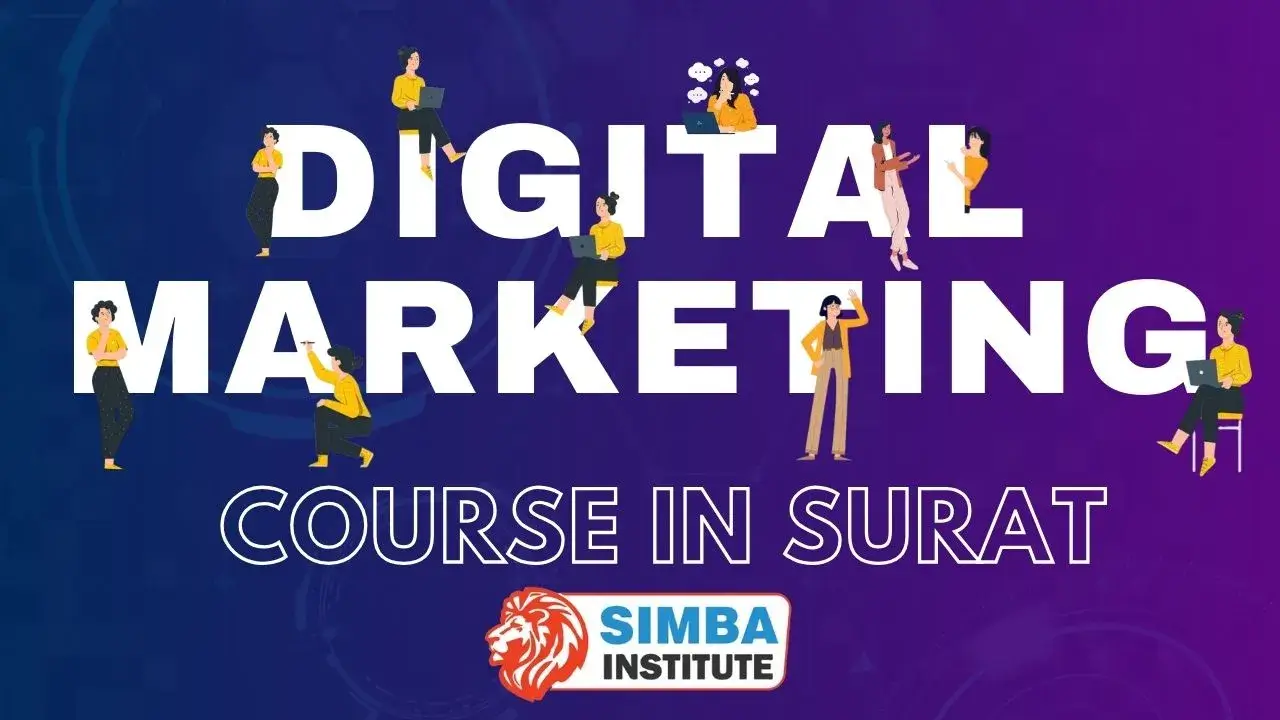
How to Start Your Career in Digital Marketing?
A career in digital marketing provides a wealth of opportunities for individuals looking to enter this dynamic and fast-paced field in today’s digitally-centric world. Starting your journey in digital marketing can be exciting and rewarding, regardless of whether you are a recent graduate or looking to change careers. This is a clear, step-by-step guide that will help you launch a successful career in digital marketing.
Step 1: Gain a Solid Understanding of Digital Marketing Basics in Digital Marketing Course in Surat
It is important to familiarise yourself with the fundamental concepts and principles of digital marketing before diving right in. Take the time to learn about the various digital marketing channels, including search engine optimization (SEO), social media marketing, email marketing, content marketing, and pay-per-click (PPC) advertising.
- Research online resources, such as blogs, courses, and tutorials, to grasp the basics of digital marketing.
- Consider enrolling in introductory digital marketing courses offered by reputable online platforms like Coursera, Udemy, or LinkedIn Learning.
Step 2: Develop Your Digital Skills Through Hands-On Experience in The Digital Marketing Course in Surat
In the field of digital marketing, practical experience is crucial, even though theoretical knowledge is also valuable. Seek out chances to work on side projects, internships, or freelance jobs to obtain practical experience.
- Create your own blog or website to experiment with content creation, SEO techniques, and social media promotion.
- Offer to manage social media accounts or run digital marketing campaigns for local businesses or nonprofits to build your portfolio.
Step 3: Hone Your Analytical and Technical Skills in The Digital Marketing Course in Surat
Due to the data-driven nature of digital marketing, measuring campaign performance and deriving meaningful insights requires expertise with analytics tools and platforms. Familiarise yourself with popular analytics tools like Google Analytics and marketing automation platforms like HubSpot or Mailchimp.
- Take online courses or tutorials to learn how to navigate analytics platforms and interpret key metrics.
- Practice analyzing data and coming to conclusions to optimize marketing strategies and improve performance.
Step 4: Specialise in a Specific Area of Digital Marketing Course in Surat
Think about focused in a specific field of digital marketing it works with your interests and talents as you develop experience and expertise, Digital advertising, email marketing, content marketing, social media management, and SEO are a few examples of specialisations.
- Determine your areas of interest and strength in digital marketing, then focus on developing those skills.
- Obtain further education or certification in the field of your choice to increase your marketability and reputation.
Step 5: Build a Strong Professional Network Through Digital Marketing Course in Surat
Building a network is important for developing your digital marketing job. To grow your network and keep updated on opportunities and trends in this marketplace, connect with professionals in the field through virtual communities, industry events, and social media.
- Connect with similar people and take part in conversations by joining digital marketing groups on social media sites like Facebook and LinkedIn.
- Attend webinars, workshops, or business events to network with professionals in the field and learn useful information about new trends.
Step 6: Stay Updated and Adapt to Industry Trends On Digital Marketing Course in Surat
The world of digital marketing constantly evolves with new trends and technology on a regular basis. Join in on continuing education programs, subscribe to newsletters, and follow industry blogs to stay up to date on industry trends.
- If you want to stay up to date on the most recent innovations and best practices in digital marketing, set aside some time each week to read business publications, blogs, or podcasts.
- Develop a mindset of constant growth and change to stay relevant and competitive in the constantly changing field of digital marketing.
It can be achieved to start a career in Digital Marketing Course in Surat with passion and education. Learn the fundamentals, gain practical expertise, and improve your capacity for analysis.
For success in this highly competitive field, focus on your field of expertise, build your professional network, and stay up with the latest developments.
What is the average salary for a digital marketer After Digital Marketing Course in Surat?
After completing their Digital Marketing Course in Surat, Simba Institute gives a guarantee to their students for a Job Placement. The pay range for digital marketers varies from business to business.
Digital marketer salaries in India range from 4 lakhs to 9.1 lakhs for those with fewer than one year of experience to eight years of experience, with an average yearly pay of 3 lakhs based on 3.4 lakhs of current earnings.
Indian digital marketers’ salaries are growing at a strong rate, which is consistent with the sector’s explosive growth. The need for qualified workers is growing as more and more businesses rely on digital platforms, which is raising salaries.
Digital marketing specialists at the entry level should anticipate competitive starting salaries, whereas more seasoned experts command higher compensation levels.
Specialised positions with even higher earning potential include data analysts and SEO specialists. In India’s changing digital landscape, becoming a digital marketer is a lucrative career choice, especially as companies prioritise online presence. The trend of salary growth for digital marketers shows no signs of slowing down.
Discover How to Take Advantage of the Untapped Potential of Digital Marketing Course in Surat!
Digital marketing is like a superpower for businesses in today’s world. It’s all about using the internet and digital platforms to reach more people and grow your brand. But here’s the exciting part that you would like to notice that many businesses haven’t fully tapped into its potential yet!
Think of it this way: Imagine you have a store in a bustling city, but only a few people know about it because you haven’t put up any signs or advertisements. That’s like having a business online but not using digital marketing to tell people about it.
So, how do you take advantage of this untapped potential? Here are some tips that you need to have a look at.
- Get Social: Start by creating profiles on social media platforms like Facebook, Instagram, and Twitter. These are like virtual hangout spots where you can connect with your audience, share updates about your business, and even run ads to reach more people.
- Be Searchable: When people look for products or services like yours online, you want them to find you easily. That’s where search engine optimization (SEO) comes in. By optimising your website and content, you can improve your chances of showing up higher in search engine results.
- Create Compelling Content: Content is king in the digital world. Whether it’s blog posts, videos, or infographics, creating valuable and engaging content can help you attract and retain customers. Share tips, stories, and behind-the-scenes glimpses of your business to connect with your audience on a deeper level.
- Try Paid Advertising: While organic reach is great, sometimes you need a little boost to reach a larger audience. That’s where paid advertising comes in. Platforms like Google Ads and Facebook Ads allow you to target specific demographics and interests, ensuring your message gets in front of the right people.
- Track and Analyze: One of the best things about digital marketing is the ability to track your efforts and see what’s working. Pay attention to metrics like website traffic, social media engagement, and conversion rates. This data can help you fine-tune your strategies and get even better results over time.
Your business can reach its maximum potential and discover a plethora of chances by embracing digital marketing and experimenting with these techniques. So, why do you hesitate? It’s time to advance your internet visibility!
Why is Digital Marketing Course Receiving So Much Attention?
Digital marketing is like the superhero of advertising in the digital age. It’s all about promoting products or services using digital channels like websites, social media, email, and search engines. Instead of traditional methods like billboards or newspaper ads, digital marketing harnesses the power of the internet to reach potential customers where they spend most of their time – online.
Why is Everyone Talking About The Digital Marketing Course in Surat?
- Reach Anywhere, Anytime: Imagine having a billboard that follows your potential customers wherever they go, whether they’re at home, at work, or even on vacation. That’s the beauty of digital marketing – it’s accessible 24/7, reaching people wherever they are and whenever they’re online.
- Targeted Advertising: Ever felt like traditional ads are speaking to everyone and no one at the same time? With digital marketing, you can target your message to specific demographics, interests, and behaviors. This means you’re not wasting your advertising budget on people who aren’t interested in what you offer.
- Measurable Results: One of the coolest things about digital marketing is that you can track almost everything. Want to know how many people visited your website, clicked on your ad, or made a purchase? Digital marketing tools can give you those answers in real-time, allowing you to measure the success of your campaigns and make data-driven decisions.
- Cost-Effectiveness: Compared to traditional advertising methods, digital marketing can be much more cost-effective. Whether you’re a small startup or a big corporation, there are digital marketing strategies that fit every budget. Plus, you have more control over how much you spend and can adjust your tactics on the fly.
- Engagement and Interaction: Digital marketing isn’t just about broadcasting your message; it’s about starting a conversation with your audience. Whether it’s through social media posts, email newsletters, or interactive content, digital marketing allows you to engage with your customers in meaningful ways, building relationships that can lead to long-term loyalty.
- In Conclusion
Digital marketing isn’t just a buzzword – it’s a game-changer for businesses of all shapes and sizes. By leveraging the power of the internet and digital channels, you can reach more people, target your message more effectively, and measure your results with precision.
So, if you’re not already on the digital marketing bandwagon, now’s the time to hop on board and unlock the endless possibilities it offers for your business.
Unleashing The Potential: How the World and Your Career Can Change with Digital Marketing Course in Surat
There is a powerful force in the fast-paced world of the digital era that has the ability to change lives, impact international dialogue, and modify careers. None else than digital marketing is that force. But how precisely can you use the power of digital marketing to advance your career while also having a significant impact on the world? Let’s explore this fascinating story.
In today’s digital age, learning the art of Digital Marketing Course in Surat is more than just boosting your career; it is about wielding a powerful tool with the capacity to change the world. Individuals who embrace digital marketing can elevate their professions while also influencing global discourse and driving genuine change.
Whether you’re a starting entrepreneur, a seasoned professional, or an aspiring influencer, The Digital Marketing Course in Surat Offers limitless potential. The options are boundless, from using social media platforms to magnify your voice and reach to using data-driven insights to create captivating tales and drive meaningful campaigns.
What kind of question could be asked in a digital marketing job interview After Digital Marketing Course in Surat?
- How do you identify and target the right audience for a digital campaign?
- What are the key elements of a successful SEO strategy?
- What digital marketing tools do you use regularly, and why?
- How do you handle unexpected changes or challenges during a campaign?
- What are some current trends and challenges in the digital marketing industry?
In today’s fast-paced digital environment, the function of a digital marketer is more important than ever. As businesses attempt to develop an online presence and connect with their target audience, the demand for skilled digital marketers grows.
If you’re preparing for a digital marketing job interview, you should be prepared to answer a variety of questions. Let’s take a look at some of the most typical questions you could face and how to answer them like a master.
The Quick Brief of Digital Marketing Course in Surat
Search Engine Optimization (SEO)
One of the key tenets of Internet marketing is search engine optimization or SEO. A variety of methods and approaches are used in SEO to increase a website’s exposure on search engine result pages (SERPs) in Digital Marketing Course in Surat.
Businesses may improve their organic search ranks by optimizing both on-page features like meta tags and keyword placement as well as off-page elements like backlinks and social signals. SEO is a crucial component of Digital Marketing because it increases organic traffic because of high search rankings.
Key Techniques for Optimizing Search Rankings Includes
Research Keywords Carefully to find high-value and relevant terms. producing user-focused, educational material of the highest quality.
Optimizing website structure and loading speed for enhanced user experience.Building authoritative backlinks from reputable websites in the same niche in Digital Marketing Course in Surat.
Pay-Per-Click Advertising (PPC)
Pay-per-click (PPC) advertising is the practice of placing adverts on websites or search engine results pages and only getting paid when a user clicks on the advertisement in Digital Marketing Course in Surat.
It helps businesses to target specific keywords, demographics, or interests, ensuring that the correct individuals see their adverts.
The following are methods for increasing PPC advertising ROI
Conducting thorough keyword research to identify low-competition and high-conversion keywords.
Crafting compelling ad copy and utilizing enticing visuals to capture users’ attention in Digital marketing Course in Surat.
Campaigns are continuously monitored and optimized to improve performance and get rid of advertising that isn’t working.
Implementing A/B testing to compare different ad variations and optimize for the best results.
Social Media Marketing (SMM)
The proliferation of social media platforms has made it easier than ever to connect with and engage with target audiences with Digital Marketing Course in Surat.
The promotion of goods and services via social media platforms such as Facebook, Instagram, Twitter, and LinkedIn is known as social media marketing (SMM).
Utilizing the full potential of well-known social media sites necessitates
Creating a thorough social media strategy that is adapted to the specific characteristics and target audience of each platform with Digital Marketing Course in Surat.
To increase brand visibility and promote audience interaction, create appealing and shareable content.
Building deep relationships with the audience by actively participating in dialogues and answering feedback.
Content Marketing
Businesses have turned to content marketing in an age where consumers appreciate authenticity and value-added material to position themselves as industry leaders and increase brand awareness through Digital Marketing Course in Surat.
To draw in and hold onto a clearly defined audience, content marketing involves creating and distributing worthwhile and useful information.
Crafting effective content marketing strategies involves
Identifying the goals and pain areas of the target audience, then producing content to meet those needs. Using a variety of formats to appeal to various audience preferences, such as podcasts, infographics, videos, and blog articles with Digital Marketing Course in Surat.
Publishing high-quality material often and optimizing it for search engines will increase reach and visibility naturally. Utilizing content marketing strategies to increase reach and engagement, such as social media sharing and influencer collaborations.
Email Marketing
Contrary to popular belief, email marketing remains a powerful and effective channel for communicating with customers and driving conversions through Digital Marketing Course in Surat.
To nurture leads, create a sense of loyalty in customers, and advertise goods or services, means sending targeted, personalized, and automated emails.
It is necessary for efficient consumer communication to use email campaigns
Utilizing email list segmentation to send customized content based on customer behaviour and preferences. Increasing engagement and conversions by personalizing email content, subject lines, and offers with Simba Institute’s Digital Marketing Course in Surat.
Automated email workflows are being implemented to provide timely and pertinent information, such as welcome emails, abandoned cart reminders, and follow-ups. To improve campaign success, tracking email data including open rates, click-through rates, and conversions.
Influencer Marketing
Due to its capacity to capitalize on the authority and trust influencers have established with their followers, influencer marketing has experienced substantial growth in recent years through Digital Marketing Course in Surat.
Working with influencers enables businesses to increase brand awareness, produce authentic content, and boost engagement and sales.
Influencer marketing campaign effect evaluation involves
establishing clear campaign goals, such as brand awareness, engagement, or sales, and selecting appropriate metrics to track progress.
We are monitoring the reach and engagement of influencer content through tools like social media analytics and affiliate tracking platforms with Digital Marketing Course in Surat.
surveying or interviewing influencers and their audience to get feedback on the success of a campaign. Figuring out the return on investment (ROI) by contrasting the campaign’s expenses with its earnings or other preset benchmarks.
Affiliate Marketing
In a performance-based marketing strategy known as affiliate marketing, companies pay affiliates for each customer or website visitor they generate through marketing activities.
It allows businesses to leverage their existing networks of affiliates to increase brand exposure and drive sales with the Digital Marketing Course in Surat.
Leveraging affiliate networks involves:
locating trustworthy affiliate networks that are relevant to the niche and target market of the company. Offering attractive commission rates and incentives to attract high-performing affiliates.
Providing affiliates with marketing materials, such as banners, tracking links, and optimized landing pages, to facilitate their promotional efforts to learn Digital Marketing Course in Surat with Simba Institute.
Monitoring affiliate performance regularly and refining the program to maximize conversions and earnings.
Video Marketing
There is no denying the importance of video content in digital marketing course in surat, with sites like YouTube and TikTok enjoying immense development.
Videos allow businesses to deliver engaging and visually appealing messages that capture the audience’s attention and convey information effectively.
Strategies for creating engaging video campaigns include:
A solid understanding of the tastes and interests of the target audience.
Creating high-quality and professionally edited videos that align with the brand’s values and identity with the Digital Marketing Course in Surat .
Utilizing narrative strategies to arouse feelings and provide viewers with a memorable experience. Optimizing videos for search engines by utilizing relevant keywords in titles, descriptions, and tags.
Mobile Marketing
Targeting mobile users has become crucial for successful digital marketing as smartphone usage grows.
Mobile marketing involves optimizing marketing efforts for mobile devices, such as smartphones and tablets, to reach users on the go and Learn Digital Marketing Course in Surat with Simba Institute.
Techniques for optimizing mobile marketing campaigns include:
Building responsive and mobile-friendly websites that provide a seamless user experience across devices.
Utilizing mobile-specific ad formats, such as app install ads and mobile display ads, to reach a mobile audience effectively Learn about the Digital Marketing Course in Surat.
Putting location-based marketing techniques into practice to target people according to their location.
Using mobile messaging platforms to send users personalized and timely messages, such as SMS and push alerts.
Native Advertising
Native advertising has emerged as a non-disruptive form of advertising that blends seamlessly into the surrounding content.
This approach aims to provide value to the audience while still promoting a product or service.
Examples and benefits of native advertising include:
Sponsored articles or advertorials that mimic the style and tone of the publication they appear in.
Native displays ads that resemble the look and feel of the website they are placed on.
In-feed social media ads that seamlessly integrate into users’ social media feeds. The benefits of native advertising include improved user engagement, higher click-through rates, and increased brand trust through non-intrusive messaging.
FAQs
> Has worked on multiple real time Digital Marketing projects
> Working in a top MNC company in surat
> Trained 2000+ Students so far
> Strong Theoretical & Practical Knowledge
> Certified Professionals
The future of digital marketing is generally quite promising. It's an exciting moment to work in the sector because there are so many prospects for innovation and expansion.
101, Deepkamal-2,
Sarthana Jakat Naka,Surat,
Gujarat 395006.
Interview Questions
On-Page Optimization
Keyword Research
Quality Content
Mobile-Friendliness
Site Structure and Navigation
Backlink Profile
Technical SEO
User Experience (UX)
Local SEO (if applicable)
Regular Monitoring and Optimization
Google Analytics: This tool provides valuable insights into website traffic, user behaviour, and conversion tracking
Google Ads (formerly Google AdWords):For managing pay-per-click (PPC) advertising campaigns, Google Ads is indispensable
SEMrush: SEMrush is a comprehensive SEO tool that helps me conduct keyword research, track rankings, analyze competitor strategies, and audit website performance
Hootsuite: For social media management, Hootsuite is my go-to tool.
Mailchimp: Email marketing is a powerful tool for nurturing leads and engaging with customers.
Buffer: Buffer is another valuable social media management tool that allows me to schedule posts, analyze engagement, and collaborate with team members.
Canva: Visual content is essential for capturing audience attention and conveying brand messaging.
HubSpot: As an all-in-one marketing platform, HubSpot provides tools for email marketing, CRM, lead generation, and content management.
These digital marketing tools enable me to run campaigns more efficiently, monitor performance correctly, and tweak strategy for maximum impact. By using the appropriate technologies, I can provide customised, data-driven marketing solutions that provide results for my clients or organisations.
